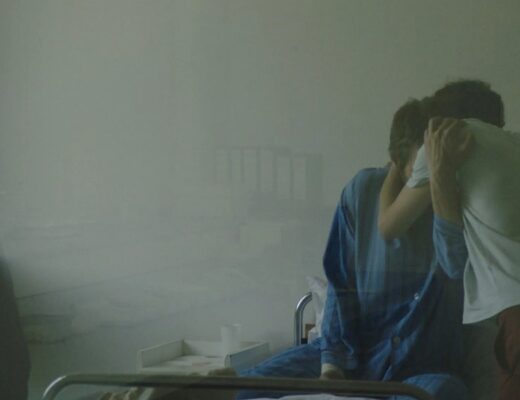Over the course of his decades-long career, Christian Petzold has come to shape something like a cinema of failure; potently and precisely carving itself from lives immobilized and drowning in the quicksand of historical progress. More than any of his Berlin School contemporaries, time and the degree to which it can be stretched across a single frame — augmenting its possibilities — features centrally in his works and delimits a space wherein primal energies and forbidden passions can assert themselves against truths-to-be or external demands. The moment, accordingly, is what his second entry in the “Ghosts” trilogy, Gespenster, begins with: a car ride in repose against the sweep of post-Wall Berlin, its lone driver operating wordlessly and instinctively. Providing these images some semblance of inexplicable, if downcast, beauty are the strains of a Bach cantata; it’s a beauty abruptly hollowed out by the subsequent cut to Nina (Julia Hummer) clearing trash in an empty park, rustling leaves taking over the soundscape. She is a foster child, any hopes of autonomy or self-fulfilment bordered by a strict regiment, and a lack of company. The sound of a woman screaming, however, interrupts this state of equilibrium, and sends Nina investigating. She finds a stray earring near the scene, arriving in time to witness the woman’s attackers fleeing and making eye contact with her.
So intimate is the bond cemented within this exchange of glances, promising connection and fomenting mental rebellion, that Nina later offers her clothes to replace the woman’s — who, we soon learn, is named Toni (Sabine Timoteo) — tatters, even hiding her from a patrol group whose belongings she has stolen. Crucially, their budding friendship plays alongside a mother, Francoise’s search for the daughter she lost outside a supermarket years ago. Neither path initially parallels the other beyond tangential, disjointed verbal references by the latter to a girl she intends apologies to. As with the inchoate narrator of Samuel Beckett’s The Unnamable, every individual appears constituted solely within the productive function of the spoken word and its elaborate constructions. Directly communicated, clear motivation is subordinated to the ambiguity of gesture, perceived differently by each party; mediated through corporeal transmission and material transaction. A chance meeting presenting an opportunity for Nina and Francoise to be reconciled is abandoned before the teenager’s true identity can be revealed, by her newfound friend’s attempt at finessing Francoise.
This question will continue unanswered for the film’s remainder: in a particularly affecting scene, the camera observes Toni studying Nina’s back for evidence of the birthmark her would-be mother claims is imprinted between her shoulder blades. Toni’s figure blocks any glimpse of the action; we’re privy only to the faces of the two staring into a mirror, and the shot cuts before any satisfying response is given. Later, both audition for a role in the show Freundinnen (Girlfriends), which sees Nina playing up her introduction to Toni — replacing her mugging with sexual assault — in a bid to impress the casting director. Where Toni’s growing status and possession of selfhood is driven by her determination and facility with leveraging others’ desires to her advantage, Nina clings to the emancipatory potential of love, in its sundry conflated forms, savoring the faint but indelible memory of their first kiss and the untold mileage it anticipated for their relationship. Indeed, the story of her progression throughout is told and literalized through the clothes she wears — from laborer, to delinquent on the lam, to independent member of society, albeit a vector for another’s reformation. Francoise, for all her abiding maternal love and courage in wishing to essentially resurrect her child’s memory in the form of another who bears the slightest resemblance, ultimately wishes a Lazarus-like replica of the sweetheart she never got to know fully, making clear both her incapacity to function without such a fictive premise and the impossibility of sustaining it for long.
The dual commitment and insularity assured by these asymmetrical arrangements steers Nina toward a daring alternative: forging ahead alone, once again charting the same path of vitiated longing. Whether she continues this cycle, anchoring her youthful infatuations and unfulfilled love to new bodies, or walls herself off to the prospect of starting again is entirely unclear by the time she sets off at the film’s close. In Petzold’s worlds, one hopes that will alone is enough to stand against the motor of history and its machinations, and that the sublimity of moments may someday build into something permanent.
Part of Christian Petzold: In the Cut.







